
Charles-Édouard Jeanneret, known as Le Corbusier, was a Swiss-French architect, designer, painter, urban planner and writer, who was one of the pioneers of what is now regarded as modern architecture. He was born in Switzerland and became a French citizen in 1930. His career spanned five decades, in which he designed buildings in Europe, Japan, India, as well as North and South America. He considered that "the roots of modern architecture are to be found in Viollet-le-Duc".

Charles-Marie-Photius Maurras was a French author, politician, poet, and critic. He was an organizer and principal philosopher of Action Française, a political movement that is monarchist, anti-parliamentarist, and counter-revolutionary. Maurras also held anti-communist, anti-Masonic, anti-Protestant, and anti-Semitic views, though he was highly critical of Nazism, referring to it as "stupidity". His ideas greatly influenced National Catholicism and integral nationalism, with a major tenet of his views being that "a true nationalist places his country above everything".

The oldest traces of human occupation in Paris are human bones and evidence of an encampment of hunter-gatherers dating from about 8000 BC, during the Mesolithic period. Between 250 and 225 BC, the Parisii, a sub-tribe of the Celtic Senones, settled on the banks of the Seine, built bridges and a fort, minted coins, and began to trade with other river settlements in Europe.

Maurice Pujo was a French journalist and co-founder of the nationalist and monarchist Action Française movement. He became the leader of the Camelots du Roi, the youth organization of the Action Française which took part in many right-wing demonstrations in the years before World War II (1939–45). After World War II he was imprisoned for collaborationist activity.
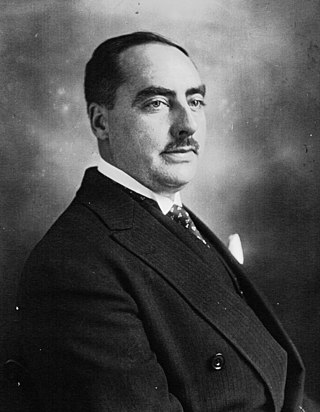
Pierre-Charles Taittinger was the founder of the Taittinger champagne house and chairman of the municipal council of Paris in 1943–1944 during the German occupation of France, in which position he played a role during the Liberation of Paris.
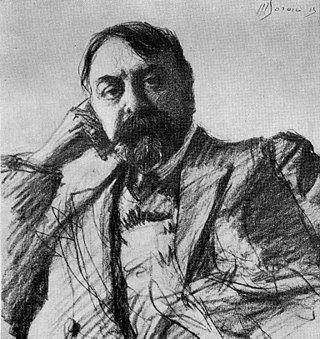
Henri Vaugeois was a French teacher and journalist who was one of the founders of right-wing nationalist Action Française movement.

Antoine Redier was a French writer who was leader of the far-right Légion organization in the 1920s.
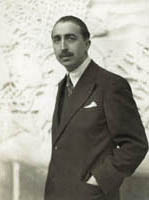
Albert Laprade was a French architect, perhaps best known for the Palais de la Porte Dorée. During a long career he undertook many urban renewal projects as well as major industrial and commercial works. A skilled artist, he published a series of sketch books of architecture in France and other Mediterranean countries.
Pierre Winter was a French doctor and hygienist.
François de Pierrefeu was a French engineer and urban planner.

René-Charles Platon was a French admiral who was responsible for the Colonial Ministry under the Vichy government. He was a passionate supporter of the Révolution nationale of Vichy France, which he wanted to export to the colonies. He was hostile to elected bodies, anti-Semitic, anti-Masonic and supported the back-to-the-soil movement. He saw Britain as the enemy of France. After the Allied invasion of Normandy, he was captured by French partisans in the summer of 1944, given a summary trial, and executed.

Pierre Ferri was a French stockbroker and conservative politician who was Minister of Posts, Telegraphs, and Telephones in 1953–54.
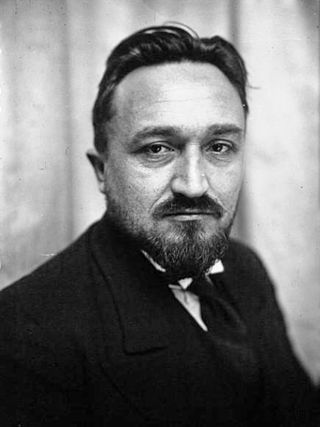
Eugène Frot was a French politician who was Minister of Merchant Marine (twice), Minister of Labor and Social Assurance (twice) and Minister of the Interior in various short-lived cabinets between December 1932 and February 1934. While he was Minister of Interior, right-wing groups organized street demonstrations in Paris on 6 February 1934 in which the police shot dead fourteen people. In the aftermath the cabinet was forced to resign. Frot supported Republican institutions, but by the late 1930s was a committed pacifist. In July 1940 he voted for the constitutional change that established the collaborationist Vichy government. As a result, he was barred from politics after the war.

Alex Moscovitch was a French politician and analyst. He was also an associate and companion of General Charles de Gaulle.

The Ligue de la patrie française was a French nationalist and anti-Dreyfus organization. It was officially founded in 1899, and brought together leading right-wing artists, scientists and intellectuals. The league fielded candidates in the 1902 national elections, but was relatively unsuccessful. After this it gradually became dormant. Its bulletin ceased publication in 1909.

La Cité de Refuge is a building in Paris, France designed by the architect Le Corbusier. It was designed for the Salvation Army and opened in 1933. Since that time it has been occupied by the French Salvation Army. The building, one of Le Corbusier's first urban housing projects, was designated a National Historical Monument of France in 1975.

Count Bernard de Vésins was a French soldier, essayist, practicing Catholic and right-wing Action Française militant. He was hostile to Freemasons, Jews and socialists, whom he considered to be working together in conspiracy to undermine the traditional Catholic values of France. In the 1920s he was President of the Ligue d'Action Française during a period when the Catholic Church was disassociating itself from the movement.
Pierre-Charles Krieg was a French politician and lawyer.

Marius Plateau was a French engineer, WWI sergeant, and French Royalist militant. Plateau was an editor of Action Francaise and a former secretary general of the Camelots du Roi. In 1923, Plateau was assassinated by the French anarchist Germaine Berton, who was later acquitted.
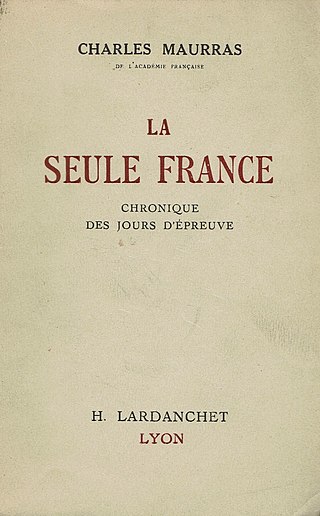
La Seule France is a book published in 1941 by the journalist and French politician Charles Maurras, director of L'Action française. Maurras supports an isolationist position between Nazi Germany and Great Britain during World War II, and was resolutely opposed to collaborationism.

















